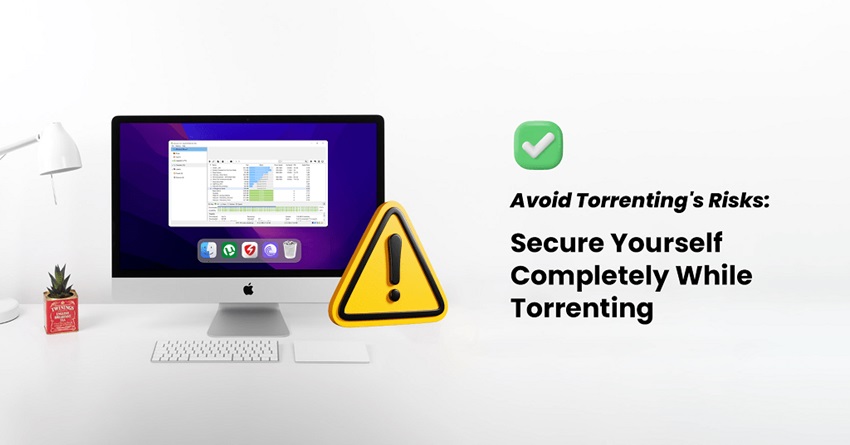
Avoid Torrenting’s Risks: Secure Yourself Completely While Torrenting
- March 14, 2023
- 6 minutes Read
- Torrenting
Torrenting is a popular method for sharing files over the internet. However, it comes with risks and dangers that can leave you vulnerable to cyber threats. From malware infections to legal repercussions, torrenting can have significant consequences if not done carefully. As a VPN service provider, we understand the importance of securing your online activities and keeping your data safe from prying eyes. This article will discuss the risks associated with torrenting, how to choose the right torrent client, and how to secure your torrenting activities with a VPN.
Table of contents
- What is Torrenting, and Why is it Risky?
- Common Risks of Torrenting You Need to Be Aware Of
- How to Choose the Right Torrent Client to Keep Yourself Safe
- Protecting Your Online Identity and Privacy While Torrenting
- Steps to Secure Your Torrenting Activities with a VPN
- Ensuring Safe Downloads: How to Spot Fake Torrent Files
- Alternatives to Torrenting: Legitimate Ways to Access Digital Content
What is Torrenting, and Why is it Risky?
Torrenting is a file-sharing method that allows users to download and upload large files quickly and easily. Unlike traditional file-sharing methods, torrenting allows users to download and upload files simultaneously, making it faster and more efficient. However, torrenting is often associated with illegal activities, such as sharing copyrighted content. This is one of the primary causes why torrenting is considered risky.
Common Risks of Torrenting You Need to Be Aware Of
The risks associated with torrenting are numerous and can have severe consequences. Here are some of the considerable risks of torrenting that you need to be aware of:
✅ Malware Infections: Torrents are notorious for containing malware, including viruses, Trojans, and other types of malicious software. These malware infections can cause significant damage to your computer and compromise your data.
✅ Legal Repercussions: Sharing or downloading copyrighted content through torrents is illegal and can lead to legal consequences. You may receive a warning letter from your internet service provider or face fines and jail time.
✅ Privacy and Security Risks: When you torrent without a VPN, your online activities are visible to your internet service provider and other third parties. This puts your online privacy and security at risk.
✅ ISP Throttling: Internet service providers often throttle the internet speed of users who engage in torrenting activities. This can lead to slow download speeds and interrupted downloads. Using a premium VPN, you can bypass ISP throttling. Check out how you can bypass ISP throttling.
How to Choose the Right Torrent Client to Keep Yourself Safe

Choosing the right torrent client is crucial to keeping yourself safe while torrenting. Here are some aspects to consider when selecting a torrent client:
✅ Reputation: Choose a torrent client with a good reputation and a large user base. This ensures that the software has been tested and is trustworthy.
✅ Security Features: Look for a torrent client that offers security features such as encryption and blocking peer-to-peer connections.
✅ User Interface: Choose a torrent client with a user-friendly interface that is easy to navigate.
✅ Advertisements: Avoid ad-supported torrent clients, as they may contain ads that lead to malicious websites.
Protecting Your Online Identity and Privacy While Torrenting
The best practice to protect your online identity and privacy while torrenting is to use a VPN. A VPN encrypts your internet connection and masks your IP address, making it hard for anyone to follow your online activities. Here are some of the ways how a VPN can protect you while torrenting:
✅ Encryption: A VPN encrypts your internet connection, making it impossible for anyone to intercept your data.
✅ IP Address Masking: A VPN hides your IP address, causing it difficult for anyone to follow your online activities.
✅ DNS Leak Protection: A VPN also protects against DNS leaks, which can reveal your actual IP address.
✅ Kill Switch: Some VPNs offer a kill switch feature that disconnects your internet connection if the VPN connection drops, preventing your online activities from being exposed.
Steps to Secure Your Torrenting Activities with a VPN
Here are the steps to secure your torrenting activities with a VPN:
✅ Choose a reputable VPN service provider that offers strong encryption and a no-logs policy.
✅ Install the VPN software on your device.
✅ Connect to a VPN server.
✅ Open your preferred torrent client and start downloading or uploading files.
✅ Always keep the VPN connection on while torrenting.
Ensuring Safe Downloads: How to Spot Fake Torrent Files
One of the most significant risks of torrenting is downloading fake torrent files that contain malware or viruses. Here are some tips to spot fake torrent files:
✅ File Size: If the file size is too small, it’s likely a fake torrent file. Always check the file size against the original file size.
✅ Check the Seeder/Leecher Ratio: If the seeder/leecher ratio is too low, it’s likely a fake torrent file. Always check the seeder/leecher ratio before downloading any torrent file.
✅ Check the Comments Section: Before downloading a torrent file, always check the comments section. If there are many negative comments, it’s likely a fake torrent file.
✅ Check the Uploader: Always check the uploader’s reputation and history before downloading a torrent file. If the uploader is new or has a bad reputation, it’s likely a fake torrent file.
Alternatives to Torrenting: Legitimate Ways to Access Digital Content
There are many legitimate ways to access digital content without torrenting. Here are some other options:
✅ Streaming Services: Popular streaming services such as Netflix, Hulu, and Amazon Prime offer a vast library of movies and TV shows.
✅ Digital Marketplaces: Digital marketplaces such as iTunes, Google Play, and Amazon offer a wide selection of music, movies, and TV shows for purchase.
✅ Public Domain: Many classic books, music, and movies are in the public domain and can be accessed for free.
Conclusion
Torrenting can be a convenient way to share and download files, but it comes with many risks and dangers. From malware infections to legal repercussions, torrenting can lead to significant consequences if not done carefully. The best way to safeguard your online identity and privacy while torrenting is to use a reputable VPN service provider. Additionally, it’s crucial to choose a trustworthy torrent client, avoid fake torrent files, and practice safe torrenting best practices. Remember, there are also legitimate ways to access digital content, and it’s important to explore these options before resorting to torrenting.
![Ultimate White Label VPN Business Guide 2026 [Cost & ROI]](https://symlexvpn.com/wp-content/uploads/2026/01/Ultimate-White-Label-VPN-Business-Guide-2025-Cost-ROI_2-376x114.webp)
